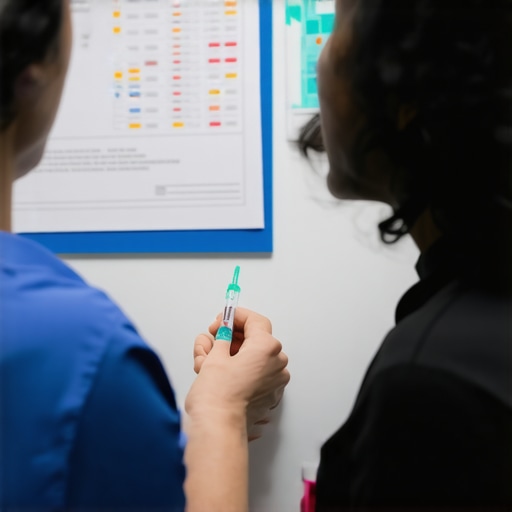Injecting Confidence: Your Guide to a Safer Weight Loss Journey
Ever felt like your weight loss journey is a bit of a gamble? Well, with the surge of injection-based programs like GLP-1 receptor agonists, the stakes are higher—and so is the potential for side effects. But fear not! Navigating this new frontier doesn’t mean you’re doomed to discomfort. It’s all about knowledge, preparation, and a dash of common sense.
Why Do Side Effects Happen? The Inside Scoop
Before diving into tips, let’s understand the enemy—side effects. These reactions are often your body’s way of saying, “Hey, I wasn’t expecting that!” Common issues include nausea, injection site reactions, or even fatigue. They’re usually mild but can be annoying enough to derail your progress if you’re unprepared.
Tip 1: Partner Up with Your Healthcare Hero
Think of your doctor as your co-pilot. Expert guidance isn’t just a luxury; it’s a necessity. They can tailor your dosage, monitor your health, and catch adverse reactions early. Remember, safe weight loss isn’t a solo mission—get that medical team involved!
Tip 2: Start Low, Go Slow—The Golden Rule
Jumping straight into high doses is like sprinting before you can walk. Gradually increasing your dose helps your body adapt, minimizing side effects. It’s a strategy backed by science: Long-term success hinges on patience and moderation.
Tip 3: Keep Hydrated and Nourished
Dehydration and low blood sugar can amplify side effects. Drinking plenty of water and maintaining balanced meals can make injections more tolerable. Plus, it keeps your energy levels up for those daily activities—and your mood in check!
Tip 4: Be Vigilant to Your Body’s Signals
Notice any unusual reactions? Don’t brush them off. Promptly report side effects to your healthcare provider. They might adjust your dose or suggest remedies. Remember, your body’s feedback is the ultimate guide on this journey.
Is It Possible to Avoid Side Effects Entirely? The Real Talk
Complete avoidance? Maybe not always possible. But with proper precautions, you can significantly reduce their severity and duration. It’s about proactive management, not just reacting when things go awry.
If you’re serious about making this a sustainable part of your weight loss arsenal, check out comprehensive tips at this resource. And remember, sharing your experiences or questions below can help others navigate their own path more confidently.
Uncovering the Nuances of Injection Side Effects: What Are the Hidden Factors?
While most discussions focus on common side effects like nausea or injection site reactions, there’s a deeper layer worth exploring. Factors such as individual genetics, underlying health conditions, and even psychological readiness can influence how your body responds to injectable weight loss medications. Recognizing these variables allows you to tailor your approach more effectively and work proactively with your healthcare provider. For instance, some individuals might experience heightened sensitivity due to genetic markers affecting drug metabolism, which underscores the importance of personalized medical guidance. To delve deeper, consider reading expert insights on long-term safety strategies for GLP-1 medications.
What Are the Practical Strategies for Long-term Safety and Efficacy?
Beyond initial precautions, sustainable weight loss with injections requires ongoing vigilance. Regular monitoring, adjusting dosages based on body response, and integrating lifestyle changes are crucial. For instance, maintaining a balanced diet rich in electrolytes and fiber can help mitigate side effects like dehydration or gastrointestinal discomfort. Additionally, establishing a routine for weekly injections, coupled with consistent follow-ups, maximizes both safety and effectiveness. It’s not just about the medication; it’s about creating a comprehensive plan that includes diet, exercise, and mental health support. Learn how to optimize your injectable regimen under medical supervision.
Are There Innovative Methods to Further Reduce Side Effects and Enhance Results?
Emerging research suggests that combining injectable weight loss treatments with complementary therapies, such as targeted nutritional supplements or behavioral coaching, can improve outcomes and reduce adverse reactions. For example, some studies indicate that integrating mindfulness practices can help manage the psychological aspects of weight loss, decreasing stress-related side effects. Additionally, advancements in drug formulation may lead to more tolerable versions of current medications, decreasing injection site discomfort or gastrointestinal issues. Staying informed about these innovations can empower you to make smarter choices and collaborate more effectively with your healthcare team. For more tips on combining strategies, explore comprehensive approaches to injectable weight loss.
Have you experienced unique side effects or effective mitigation techniques? Sharing your story can inspire others on their journey. Also, don’t forget to reach out to us for personalized advice or to suggest topics you want us to cover next!
The Role of Pharmacogenomics in Personalizing Injectable Weight Loss Treatments
One frontier gaining traction is the application of pharmacogenomics—the study of how genetic variations influence drug response. Variations in genes responsible for drug metabolism, such as CYP450 enzymes, can significantly alter how individuals process GLP-1 receptor agonists. For instance, certain alleles may lead to faster clearance of the medication, reducing efficacy or increasing the risk of side effects. Recognizing these genetic markers allows healthcare providers to tailor dosing regimens precisely, minimizing adverse reactions and enhancing therapeutic outcomes.
How Can Pharmacogenomic Testing Improve Your Injectable Treatment Experience?
By identifying genetic predispositions, clinicians can decide whether standard dosing is appropriate or if adjustments are necessary. This personalized approach not only curtails side effects like nausea or injection site reactions but also ensures sustained weight loss benefits. Currently, pharmacogenomic testing is becoming more accessible and affordable, paving the way for its integration into routine weight management protocols. For a comprehensive review, see this detailed study on pharmacogenomics and weight management.
Innovative Drug Formulations and Delivery Systems: The Future of Tolerability
Beyond genetic tailoring, pharmaceutical advancements are paving the way for formulations that inherently reduce side effects. Extended-release injectables, microencapsulation techniques, and bioresorbable implants are designed to provide smoother drug release profiles, thereby minimizing peaks that trigger adverse reactions. For example, the development of ultra-long-acting GLP-1 analogs not only improves adherence but also lessens injection frequency, which can reduce injection site discomfort and psychological barriers.

Image prompt: schematic of innovative drug delivery systems for weight loss injectables, including microencapsulation and bioresorbable implants, detailed and labeled.
Synergistic Behavioral and Nutritional Interventions to Reduce Side Effects
Addressing side effects isn’t solely about medication—behavioral strategies can play a pivotal role. Incorporating mindfulness-based stress reduction techniques can lower psychological stress that might exacerbate gastrointestinal symptoms. Additionally, optimizing diet with high-fiber, low-glycemic foods can mitigate nausea and gastrointestinal discomfort, making injections more tolerable. These interventions not only improve patient comfort but also enhance overall weight loss outcomes by fostering healthier habits and psychological resilience.
What Are the Evidence-Based Behavioral Techniques That Complement Injectable Weight Loss?
Research indicates that cognitive-behavioral therapy (CBT) tailored for weight management effectively reduces emotional eating and improves adherence to treatment. Combining CBT with nutritional counseling and physical activity creates a holistic strategy that addresses both physiological and psychological factors. For instance, a 2021 randomized trial published in Obesity Reviews demonstrated significant improvements in weight loss and side effect management when behavioral interventions were integrated with pharmacotherapy. Explore more at this comprehensive review on behavioral strategies in weight management.
If you’re curious about customizing your weight loss plan or have experienced unique side effects, engaging with a multidisciplinary team—comprising healthcare providers, dietitians, and behavioral therapists—can provide tailored solutions. Your journey toward safe, effective weight loss deserves this level of personalized attention—don’t hesitate to seek it out.
Unlocking the Secrets to Personalized Injectable Weight Loss: The Role of Pharmacogenomics
As the landscape of injectable weight loss therapies evolves, pharmacogenomics emerges as a groundbreaking frontier, enabling clinicians to tailor treatments based on individual genetic profiles. Variations in genes like CYP450 enzymes can significantly influence how a person metabolizes drugs such as GLP-1 receptor agonists, impacting both efficacy and side effect profiles. For example, certain genetic markers may predispose individuals to heightened sensitivity or faster drug clearance, necessitating personalized dosing strategies. A 2022 study published in Nature Medicine highlights how integrating pharmacogenomic testing can reduce adverse reactions and optimize therapeutic outcomes (source).
How Can Pharmacogenomic Testing Transform Your Weight Loss Journey?
By identifying genetic predispositions, healthcare providers can fine-tune medication plans to minimize side effects like nausea, injection site discomfort, or gastrointestinal issues. This precision approach enhances patient adherence and long-term success, moving beyond the one-size-fits-all model. Incorporating pharmacogenomics into routine practice democratizes personalized medicine, making tailored weight management more accessible and effective.
Innovative Drug Delivery Systems: The Next Generation of Tolerability
Advancements in pharmaceutical technology are revolutionizing how medications are delivered, emphasizing sustained-release formulations, microencapsulation, and bioresorbable implants. These innovations aim to create smoother drug release profiles, reducing peaks that trigger adverse reactions. For instance, ultra-long-acting GLP-1 analogs allow for less frequent injections, decreasing injection site discomfort and psychological barriers, which are common hurdles in long-term therapies. A recent review in Drug Delivery Today discusses how these systems are enhancing tolerability and adherence (source).
< >
>
Image prompt: schematic of innovative drug delivery systems, including microencapsulation and bioresorbable implants, detailed and labeled.
Behavioral and Nutritional Strategies: Complementing Pharmacotherapy for Reduced Side Effects
Addressing side effects holistically involves integrating behavioral techniques and nutritional adjustments. Mindfulness-based stress reduction can mitigate psychological stress that exacerbates gastrointestinal symptoms, while high-fiber, low-glycemic diets can alleviate nausea and gastrointestinal discomfort. Combining these approaches with pharmacotherapy fosters a more sustainable weight loss journey, reducing reliance solely on medication.
What Evidence Supports Behavioral Interventions in Enhancing Injectable Treatment Tolerance?
Research demonstrates that cognitive-behavioral therapy (CBT) tailored for weight management improves adherence and reduces emotional eating, thereby decreasing side effects related to stress and eating behaviors. A 2021 study in Obesity Reviews confirms that integrating behavioral counseling with medication enhances long-term outcomes (source).
If you want to explore personalized strategies or share your experiences with side effect management, engaging with a multidisciplinary team—including healthcare providers, dietitians, and behavioral therapists—can make a significant difference. Your journey toward safe, effective weight loss is best supported by expert guidance and community support.
Expert Insights & Advanced Considerations
Personalized Pharmacogenomics Testing
Understanding your genetic makeup can significantly influence your response to weight loss injections like GLP-1 receptor agonists. Pharmacogenomic testing can identify genetic variations affecting drug metabolism, allowing for tailored dosing that minimizes side effects and maximizes efficacy. Consulting with a genetic counselor or specialist can provide valuable insights into personalized treatment plans, reducing adverse reactions and enhancing long-term success.
Innovative Drug Delivery Technologies
Emerging drug delivery systems such as microencapsulation and bioresorbable implants are transforming how medications are administered. These advancements promote sustained drug release, reduce injection frequency, and lower peak plasma concentrations that often trigger side effects. Staying informed about these innovations can help you work with your healthcare provider to choose the most tolerable and effective treatment options.
Integrative Behavioral and Nutritional Strategies
Combining pharmacotherapy with behavioral interventions like cognitive-behavioral therapy (CBT) and nutritional adjustments can mitigate side effects such as gastrointestinal discomfort and stress. High-fiber diets, hydration, and mindfulness practices support physical and psychological well-being, promoting a more comfortable and sustainable weight loss journey. Collaborating with a multidisciplinary team ensures personalized care addressing both physiological and emotional factors.
Expert Recommendations & Resources
- Strategies to Minimize Side Effects in Prescription Weight Loss Injections
- Mastering Safe Use of Prescription Injections with Medical Guidance
- Science-Backed Tips for Long-Term GLP-1 Medication Safety
Final Perspective
In the realm of injection-based weight loss treatments, a nuanced understanding of individual genetic factors, technological innovations, and behavioral supports is paramount. Embracing a personalized approach, guided by expert insights and cutting-edge research, empowers you to navigate side effects effectively and achieve sustainable results. Remember, collaborating with healthcare professionals and staying informed about emerging strategies will keep you at the forefront of safe, effective weight management. For deeper engagement and tailored advice, don’t hesitate to reach out through our contact page. Your journey toward optimal health is a collaborative effort—stay proactive and informed.


I really appreciate this comprehensive overview of managing side effects with injection-based weight loss treatments. From personal experience, starting with a low dose and gradually increasing really makes a difference in tolerability. I wish I had known about pharmacogenomics testing earlier; understanding my genetic predispositions might have helped tailor my treatment plan more effectively and reduce some initial side effects. The section on advanced drug delivery systems is fascinating—it’s encouraging to see innovation making long-term treatment more tolerable and convenient. Also, integrating behavioral strategies like mindfulness and dietary adjustments complements pharmacotherapy well in my journey. Has anyone tried combining these approaches and noticed a difference in side effect severity or weight loss progress? I’m curious about others’ experiences with these holistic methods or any additional tips that worked for them.